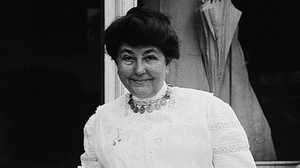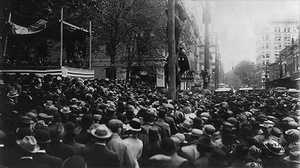Legislative Victories
Woodrow Wilson settled into his new job as president with a deep sense of mission. His domestic program, called the New Freedom, sought to extend opportunity to all, and wrest power away from entrenched interests.

The Democrats carried majorities in both houses of Congress, and many newly elected rank-and-file lawmakers were eager to gain favor with Wilson by supporting his agenda. Party leaders, controlling powerful committee chairs after many terms in the minority, were also willing to give the president much of what he wanted. Wilson exerted his power boldly – more than any chief executive had done before – by drawing from his strengths as orator, educator and political scholar. He cast complex legislation in moral and uplifting terms. He often conferred with party leaders, to find and build consensus. He participated actively in drafting the details of proposed legislation.
Most dramatically, Wilson journeyed more often to Capitol Hill than any president had before. To inaugurate his unprecedented legislative effort, he broke with 113 years of tradition by personally addressing a joint session of Congress, drafting his speech himself on a newfangled machine – the typewriter. But Wilson didn't stop there. The day after his historic congressional address, Wilson lobbied legislators from the Capitol's rarely used President's Room. He also found useful operatives in political aides drawn from the Democratic Party's various blocs. These aides provided conduits through which Wilson received counsel and compelled discipline. His first two years produced some of the most enduring reform in history, including the establishment of the Federal Reserve and passage of the Clayton Anti-Trust Act.
Nearly all who came to see him were struck by the president's deep sense of mission. When the chairman of the Democratic Party came to demand a job in return for helping Wilson win the presidency, Wilson told him that it was not the Democratic Party, but God, who had made him president.
Wilson was fortunate that in his early days in office there was little organized opposition to his plans for change. Yet although Wilson accomplished many major legislative goals during his first two years in office, events appeared to stall continued reform. Political opposition strengthened when the newly reunified Republican Party eroded Democratic control of Congress at the midterm elections in 1914. Enthusiasm for reform was inhibited more by the onset of an economic recession, which triggered pro-business legislation as a means of revitalizing the economy. It seemed Wilson's political future was dependent upon a move to the right.
Looking ahead to re-election, however, Wilson calculated that further reform was the only politically viable means to capture a second term. Wilson saw as his best course a consolidation of his support among Democratic Party progressives and those of the former Progressive Party. Political realities dovetailed with his own convictions to produce a legislative agenda attractive to social reformers, farmers and labor.
Legislation During the Wilson Administration
Underwood-Simmons Tariff Act (1913)
The first successful downward revision of the tariff since the Civil War, the Underwood-Simmons Tariff Act enacted an across-the-board reduction in tariffs, making manufacturers more efficient and providing consumers with competitive pricing. To compensate for lost revenue, a rider to the act created a small, graduated income tax.
Federal Reserve Act (1913)
The banking system was put under governmental supervision, loosening Wall Street's grip on the nation's finances. This act is considered Wilson's most significant accomplishment.
Seventeenth Amendment (1913)
This amendment provided for direct popular election of senators.
Federal Trade Commission Act (1914)
The Federal Trade Commission was charged with enforcing antitrust laws and preventing the unlawful suppression of competition.
Clayton Antitrust Act (1914)
The trusts were attacked and labor unions protected under this act. This law prohibited interlocking directorates and clearly defined unfair business practices. Labor unions were exempted from antitrust considerations. Benefiting labor further was the legalization of peaceful strikes, picketing and boycotts.
Seaman Act (1915)
Considered the Magna Carta of American seamen, this act set standards for the treatment of merchant sailors.
Farm Loan Act (1916)
This legislation made it easier for farmers to secure loans.
Keating-Owen Child Labor Act (1916)
The child labor act limited the work hours of children, forbade the interstate sale of goods produced by child labor, and began a new program of federal regulation in industry.
Adamson Act (1916)
This legislation established an eight-hour workday for railroad employees, and dramatically averted a potentially crippling railroad strike.
Workingmen's Compensation Act (1916)
With this act the government provided financial assistance to federal employees injured on the job.
Eighteenth Amendment (1919)
This amendment prohibited the manufacture, sale, or transportation of intoxicating liquors and their importation and exportation
Nineteenth Amendment (1920)
This amendment extended to women the right to vote.







